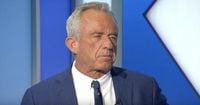The Centers for Disease Control and Prevention (CDC) in Atlanta became the epicenter of national concern and sorrow on August 8, 2025, after a deadly shooting shattered the agency’s sense of security and left a police officer and the suspected gunman dead. The attack, which authorities say was motivated by the shooter’s belief that his health problems were caused by the COVID-19 vaccine, has reignited fierce debates over public health policy, vaccine skepticism, and the safety of those working to protect the nation’s health.
The incident unfolded late Friday afternoon, just across the street from the CDC’s Roybal Campus at Emory Point, a bustling mixed-use development near Emory University. According to the Georgia Bureau of Investigation, 30-year-old Patrick Joseph White of Kennesaw opened fire shortly before 5 p.m., unleashing a hail of bullets that struck at least four buildings on the CDC campus. The Associated Press reported that more than 180 shots were fired, breaking about 150 windows and leaving CDC employees in a state of terror. Tragically, a police officer—a father of two, with another child on the way—was killed in the line of duty before the suspect was found dead with gunshot wounds inside a nearby CVS.
The shock of the attack rippled through the CDC community and the broader public health sphere. As reported by STAT, employees grappled with fear and grief, mourning the loss of a colleague who had dedicated his life to protecting others. “No one should face violence while working to protect the health of others,” U.S. Health and Human Services Secretary Robert F. Kennedy Jr. said in a statement posted to X (formerly Twitter) the morning after the shooting. “We know how shaken our public health colleagues feel today.” Kennedy added, “Public health workers show up every day with purpose—even in moments of grief and uncertainty.”
On August 12, Kennedy visited the CDC headquarters, accompanied by Deputy HHS Secretary Jim O’Neill and CDC Director Susan Monarez, to offer support and condolences to staff. He emphasized the administration’s commitment to employee safety and the importance of restoring public trust in the wake of such violence. “They work in silence, saving us all and protecting our health. They should not be the targets of this kind of violence from anybody,” Kennedy told Scripps News during a wide-ranging interview.
Yet, the aftermath of the shooting has exposed deep fissures in the nation’s approach to public health and the contentious politics surrounding vaccines. Reports from The New York Times and CNN allege that the shooter blamed his deteriorating health on the COVID-19 vaccine, a belief that has gained traction in certain circles due in part to high-profile skepticism voiced by public figures—including Kennedy himself. Over the years, Kennedy has repeatedly questioned the safety and efficacy of vaccines, promoting claims about vaccine harm that have been widely debunked by the scientific community.
This skepticism has not gone unnoticed by public health advocates and some within the CDC. A coalition of former Health and Human Services workers and supporters, known as Fired But Fighting, directly blamed Kennedy for fueling mistrust and endangering the CDC workforce. “Kennedy is directly responsible for the villainization of CDC’s workforce through his continuous lies about science and vaccine safety, which have fueled a climate of hostility and mistrust,” the group said in a statement. They called for his resignation, arguing that “the ongoing destruction of our public health infrastructure has destroyed the systems meant to prevent tragedies like this from happening.”
Senator Jon Ossoff, a Democrat who opposed Kennedy’s confirmation as health secretary, also weighed in, criticizing both Kennedy and the Trump administration for what he described as “sustained political attack” and funding cuts that have weakened the CDC. “The CDC has been under sustained political attack since this administration took power,” Ossoff said. “This is the world’s preeminent epidemiological agency responsible for protecting the American people and the world from deadly disease outbreaks, and the Secretary of Health and Human Services is a notorious crank who has embraced, over the course of his career, countless unfounded conspiracy theories about public health.”
The debate over vaccines and public trust was further stoked by Kennedy’s recent decision to halt millions of dollars in federal contracts for developing mRNA vaccine technology aimed at respiratory viruses like COVID-19 and the flu. In his interview with Scripps News, Kennedy defended the move, questioning the effectiveness and safety of the vaccines despite overwhelming scientific evidence to the contrary. “You can’t control the amount of antigen that everybody is getting,” he argued. “When you give a vaccine, you want to know exactly how much antigen is because some people react very, very badly and can get very, very badly injured.” Kennedy claimed that “5,000 peer-reviewed studies” point to vaccine-related injuries and insisted that skepticism and questioning are essential to both science and democracy. “Trusting the experts is not a feature of either a science or democracy,” he said. “There’s always questions and we’re always encouraged to have them. Science is always evolving.”
Medical experts and former CDC officials have pushed back, warning that cuts to vaccine development and the proliferation of misinformation could have dire consequences. A former CDC director told Scripps News that “many people will suffer” as a result of the funding cuts to mRNA vaccine research. Meanwhile, Kennedy maintained that the technology is still being explored for cancer treatments, where it may prove effective, but that transparency and “Gold Standard” science are needed to rebuild public trust and prevent violence tied to health misinformation. “People can ask questions without being penalized,” Kennedy said. “The way we make the public believe in us is by telling the truth—what we know and what we don’t know.”
Beyond the vaccine debate, Kennedy’s interview touched on other critical health policy issues. He addressed federal research funding policies tied to university compliance on matters such as antisemitism and the inclusion of transgender women in women’s sports, arguing that “universities that are now being defunded because they’re breaking the law should stop breaking the law, and then they will get that funding.” He advocated for a more distributed approach to research funding to avoid centralized control that could stifle scientific dissent.
Kennedy also highlighted the impact of sugar and ultra-processed foods on public health, linking them to rising diabetes rates, especially among the poorest Americans. “We are giving the poorest members of our society diabetes when they’re young, and then we’re paying for it later with Medicaid,” he said. He promised that new federal dietary guidelines would prioritize public health over commercial interests and outlined efforts to provide healthier food options in so-called food deserts through public-private partnerships. “A Big Mac costs, you know, I think $9 now... You can get high-quality food as we change these rules to incentivize people to buy better food. You’re going to see the markets respond, and you’re going to see better food going into these food deserts.”
The health secretary also addressed the growing concern over chronic traumatic encephalopathy (CTE) among athletes, particularly in contact sports. While noting that the government’s role is to conduct research and provide data, Kennedy said, “Our job is not to go out and tell people what they can do or what they cannot do. It’s to give good information, so that groups like the NFL and private groups and public officials can then make good policies that are going to advance the health of the American people.”
As the CDC community continues to mourn and the nation grapples with the aftermath of the shooting, the intersection of science, policy, and public trust remains under a harsh spotlight. The tragedy has laid bare the challenges facing America’s public health infrastructure—challenges that will demand both candor and courage from leaders, workers, and citizens alike.




